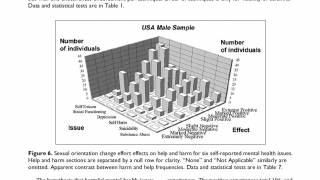New study: sexual orientation change therapy could improve mental health

A study on sexual orientation change efforts (SOCE) shows that previous theories that it may be harmful could be wrong as new evidence suggests it might improve patients’ mental health. This could be hugely significant for the government as the Home Office considers the possibility of banning what has been disparagingly labelled as ‘conversion therapy’.
For decades there has been debate surrounding the use of SOCE, and previous studies into it have been contradictory and controversial. The dominant voice has come from the American Psychological Association (APA), which formally claims that sexual orientation therapies should not be used because they are ‘most likely ineffective’ and ‘may cause harm’.
However, a new study, “Effects of Therapy on Religious Men Who Have Unwanted Same-Sex Attraction”, was first published in July of this year in The Linacre Quarterly, the longest running bioethics journal in the United States and official journal of the Catholic Medical Association.
New findings
The study found that not only does SOCE potentially improve the mental health of its participants, it can also reduce same-sex behaviour and increase opposite-sex attraction.
Researchers surveyed 125 male residents of the United States, aged 18 to 65, all with an “active belief system”, among them non-denominational Christians, Roman Catholics, Mormons and Jews.
Participants were at various stages of undergoing therapy, with 42% currently in a programme and 58% having already completed one.
The study reports that over 80% had suffered some degree of depression or suicidal thoughts at the beginning of therapy, but after therapy, the majority of participants said they had experienced a positive change in self-esteem, social functioning, depression, self-harm and suicidality.
Similarly, after therapy, some 68% self-reported some sort of reduction in their same-sex attraction and an increase in opposite-sex attraction. In fact, 70% of the participants – an overwhelming majority – claimed only beneficial effects from SOCE.
It also found that that participants found the most helpful form of therapy developing non-erotic heterosexual friendships.
Participants’ reasons for entering therapy varied, although the most common were “religious reasons”. These motivations are key to dismantling the APA’s arguments that SOCE is primarily entered into due to social and familial pressures (in fact, family pressure was only reported in 3.2% of cases), alongside its argument that it is more harmful than helpful.
A challenge to government plans
These new findings pose a significant challenge to the government’s plan to “consider all legislative and non-legislative options to prohibit promoting, offering or conducting conversion therapy”. The plan was produced in response to a national survey which revealed that 2% of the 108,000 LGBT people questioned had undergone SOCE. A further 5% had been offered it.
Prime Minister Theresa May has said the responses to the survey were “overwhelming” and that they “shone a light on the many areas we can improve the lives of LGBT people”.
Speaking earlier in July to BBC Radio 4’s Today programme, Equalities Minister Penny Mordaunt said the government would be consulting the best way to implement a ban on these therapies, adding that, “it’s absolutely right that that abhorrent practice has to go.”
Yet, even if a ban is introduced, it “will simply strengthen the determination of groups and individuals … to stand together and develop alternative means by which client rights will be recognised and professional interventions sanctioned,” argues Dr Mike Davidson, CEO of Core Issues Trust. “If the existing mental health organisations will not support this option in respect of client autonomy, the future will be to develop alternative, self-regulating sanctioning bodies. And no doubt, a legal wrangle will ensue.”
Dermot O’Callaghan, also of Core Issues Trust, agrees, posing the question: “how long [will it be] before someone brings a court case against one of the leading mental health institutions on the grounds that it has denied the person his/her human rights?”
Read more:
Christian Medical Fellowship resource: Unwanted Same-Sex Attraction (click to buy a copy)
